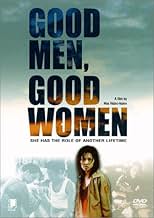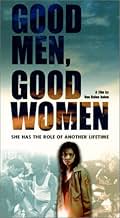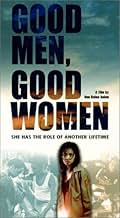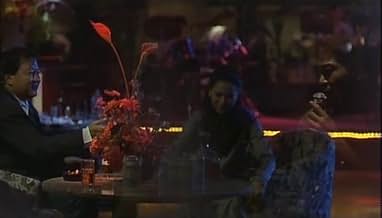Adicionar um enredo no seu idiomaIntended as the concluding film in the trilogy on the modern history of Taiwan began with Beiqing Chengshi (1989), this film reveals the story through three levels: a film within a film as w... Ler tudoIntended as the concluding film in the trilogy on the modern history of Taiwan began with Beiqing Chengshi (1989), this film reveals the story through three levels: a film within a film as well as the past and present as linked by a young woman, Liang Ching. She is being persecut... Ler tudoIntended as the concluding film in the trilogy on the modern history of Taiwan began with Beiqing Chengshi (1989), this film reveals the story through three levels: a film within a film as well as the past and present as linked by a young woman, Liang Ching. She is being persecuted by an anonymous man who calls her repeatedly but does not speak. He has stolen her diar... Ler tudo
- Direção
- Roteiristas
- Artistas
- Prêmios
- 11 vitórias e 5 indicações no total
- Direção
- Roteiristas
- Elenco e equipe completos
- Produção, bilheteria e muito mais no IMDbPro
Avaliações em destaque
Good Men, Good Women takes place in three different time sequences: the contemporary world of actress Liang Ching (Annie Shizuka Inoh), her recollection of her recent past as a drug-addicted barmaid, and the world of a yet to be made film about resistance fighters in the 1940s. Hou suggests a contrast between the sterile, corrupt lives of the present generation and the young people of the past who acted with a social conscience. While it is a complex and elliptical film, it is one of Hou's greatest, filled with tenderness and sensuality and an aching melancholy for a world whose promise has remained unfulfilled.
The film opens with a parade of young people dressed as peasants who march toward the camera singing a joyous song: "When yesterday's sadness is about to die. When tomorrow's good cheer is marching towards us. Then people say, don't cry. So why don't we sing." The camera then cuts to present day Taipei where an unidentified caller telephones Liang Chang but refuses to speak. The caller has stolen her diaries, and faxes her the pages daily prompting her to recall her tragic relationship with Ah Wei (Jack Kao), a gangster who died in a shootout. The film intersperses scenes of intimacy between the two lovers with the world of the 1940s where Chiang Bi-Yu and Hao-Tung, have left Taiwan for the Chinese mainland to support the anti-Japanese resistance. The "film within a film" shows how Chiang and Hao are forced to put their children in foster care and Liang identifies with Chiang, drawing parallels from her own experience of having to give up the things she loved the most.
Hou shows that events buried in a nation's past can have far reaching consequences and that history may be indistinguishable from personal memory. Yet the film is not one of ideas but of images and Hou has provided some memorable ones; for example, when Liang sits before a mirror putting on her makeup as Ah Wei sits closely beside her talking about the possibility of her being pregnant. It is a mundane event, yet Hou imparts it with a mysterious and timeless quality. In many ways, Good Men, Good Women is typical of Hou's films with its static camera, long takes, and rhythms of everyday life, yet it is also his most political, a searing indictment of the squandering of a nation's heritage, allowing us to see that a country, like its people, cannot redeem its future until it tells the truth about its past.
What is also clear (though the Fox Lorber DVD tonal quality is mediocre, particularly in the black and while segments) is the idealism of the Taiwanese nationalist fighters, who go to China to fight the Japanese who have been oppressing them but then after the war is over, are systematically exterminated (in a policy designed to please America, by the way). Some of these scenes, such as one where one person after another is briefly interrogated, have an arresting and somehow heartrendingly tender vérité quality, as does the scene where female fighters are taken from a prison room to be executed. There is a wealth of beauty in the film, even when the present-day sequences seem most contrived and boring, like a gangster dinner with city contractors just before Ah Wei's shot.
It is also true as Acquerello says that, "As Liang becomes the entrusted emissary for the story of Chiang Bi-Yu's struggle, she gradually becomes the generational conduit between Taiwan's turbulent past, and the decadent, uncertain future." That's about all we can say; what Hou means by this linkage is hard to guess, and perhaps only meant to be pondered, without any conclusions being drawn.
Howard Shumann has written a typically clear and informative review of "Good Men, Good Women" for Cinescene that clarifies the general structure and historical references of the film. My own reactions are quite different, however. I wouldn't be as extreme as the IMDb commenter who has called Hou's film-making "cinematic masturbation," or use the language of Sam Adams of the Philadelphia City Paper (2002) who calls "Good Men, Good Women" "a confused exercise" and suggests it's self-indulgent. But I have to agree with Adams that, "Good Men feels so arbitrary that its closing-title dedication to the victims of the anti-Communist purges of the 1950s is almost shocking; it's hard to believe the director could take a subject that seriously and make a film this self-indulgent." The shifts from the present-day actress's discomfort and her flashbacks to life with Ah Wei to the historical film-making never seem predictable. Some might find that intriguing; to me is merely seems arbitrary and random.
"Good Men, Good Women" is far more multi-layered and ambitious than a purely present-day musing like "Millennium Mambo" (despite the latter's tacked-on comment that the voice-over occurs ten years later). But the randomness of the splicings makes the implied relationship questionable, even frivolous. Hou may be better off separating his historical treatments from his modern ones, as he does quite simply with three segments in his recent "Three Times."
In modern day Taipei, an actress Liang Ching (Annie Shizuka Inoh) is rehearsing for the role of Chiang Bi-Yu, a woman who traveled to China to find the Japanese in the 1940's. Liang is struggling and distraught because of the death of her gangster boyfriend Ah Wei (Jack Kao) a few years prior and because an anonymous man is faxing her pages of her stolen diary which restitute her previous memories of her time with Ah, and after his death. Liang's imaginary episodes of what the film will be like, which are for the most part shot in black and white, her immediate present, and her immediate past are all mixed together with the deftest emotional accuracy.
The shots are so artistically accomplished that they are able to properly the connection of all history and past, with current personal events, and the eternal, constant binds of time. Liang's story nearly directly mirrors Chiang Bi Yu's. Both contemplate in alienation; when Chiang and her compatriots whom she enters China do not speak the language of those who they are trying to help because of the Japanese occupation of Taiwan which, for them, just recently ended. They are labeled as Japanese spies, and nearly killed, and upon the return to Taiwan they are labeled as communists. Because of the oppressive government and recent horrific acts committed by it they want to make a change to make life better. No matter how questionable and near-sighted their political views, they wanted to make some sort of change. Liang and her 'compatriots' are drowning in shallowness. Hou praises the courage of that older generation, but none of that is found in Liang's age. Yet, he appears to say, that these are the same people who go through similar experiences, and are only molded by the world around them, and therefore by history. Over time, the dream for a better future gives way to the dream for more profit because of the implications of history and the political.
In the previous films of the 'trilogy', Hou searched for the relationship between life and a certain form of art. Here, it is of cinema, and therefore Hou questions his own role. Ozu's 'Late Spring' plays on a television near the beginning, and in a self-referential manner, helps represents how cinema is able to understand a people, and their conflicts whether interior or exterior. In the previous films of the 'trilogy', Hou searched for the relationship between life and a certain form of art. Here, it is of cinema, and therefore Hou questions his own role. Ozu's 'Late Spring' plays on a television near the beginning, and in a self-referential manner, helps represents how cinema is able to understand a people, and their conflicts whether interior or exterior.
The regrets of the nation and the regrets of the person are all subtly laid out to dry. In order to move forward into a non-unsure and non-insecure future the regrets must be confronted. It's an eventual and long, process but one that must be done. The political invades the personal, and history's consequences affect the psychological. The implications are devastating - the present condition or 'shallowness' seemed to have been allowed to occur by the acts of the past. This is not a film that is only understandable by Taiwanese standards. It is a universal portrait of the history inherit in the present.
The haunting power of the film is completely understated and will surely always linger on in the viewer's mind. It may not have the rhapsodic epic profoundness of some of Hou's other films, but it contains the grand humanism that they also have. The film is ultimately extremely encapsulating, and with Hou's formal rigour, style, and rhythm, and the expertly grounded performances it is utterly captivating, and exquisite viewing.
Você sabia?
- ConexõesFeatures Pai e Filha (1949)
Principais escolhas
Detalhes
- Tempo de duração
- 1 h 48 min(108 min)
- Cor
- Mixagem de som
- Proporção
- 1.78 : 1























